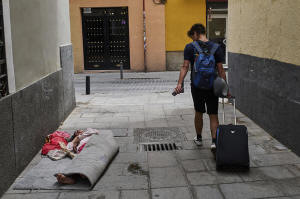Spanish government says housing market is not a 'free for all' after
recent crackdown on Airbnb
[June 04, 2025] By
SUMAN NAISHADHAM
MADRID (AP) — Spain 's government wanted to send a message last month
with its crackdown on Airbnb: that the Spanish economy and its housing
market are not a “free for all" that value profits over the rule of law,
a minister told The Associated Press on Tuesday.
The government ordered Airbnb to remove almost 66,000 holiday rentals
from the platform which it said had violated local rules by failing to
list license numbers, listing the wrong license number or not specifying
the apartment's owner. Airbnb is appealing the move.
Spain is one of the world’s most visited countries. Last year, the
Southern European nation of 49 million received a record 94 million
international visitors.
But a housing affordability problem that is particularly acute in cities
such as Madrid and Barcelona has led to growing antagonism against
short-term holiday rentals. Airbnb is perhaps the best-known and most
visible actor.
The Spanish government says the two are related: the rise of Airbnb and
other short-term rental companies, and rising rents and housing costs.
“Obviously there is a correlation between these two facts,” Consumer
Rights Minister Pablo Bustinduy told the AP. “It’s not a linear
relation, it’s not the only factor affecting it, there are many others,
but it is obviously one of the elements that is contributing.”

A recent Bank of Spain report said the country has a shortfall of
450,000 homes. In the tourist hot spots of the Canary and Balearic
Islands, half the housing stock is tourist accommodations or properties
owned by nonresidents, the report said.
“Tourism is for sure a vital part of the Spanish economy. It’s a
strategic and very important sector. But as in every other economic
activity, it must be conducted in a sustainable way," Bustinduy said.
“It cannot jeopardize the constitutional rights of the Spanish people.
Their right to housing, but also their right to well-being.”
The country has seen several large protests that have drawn tens of
thousands of people to demand more government action on housing.
Homemade signs including one that read “Get Airbnb out of our
neighborhoods” at a recent march in Madrid point to the growing anger.
“A balance must be found between the constitutional rights of the
Spanish people and economic activities in general," Bustinduy said.
Regional governments in Spain are also tackling the issue. Last year,
Barcelona announced a plan to close down all of the 10,000 apartments
licensed in the city as short-term rentals by 2028 to safeguard the
housing supply for full-time residents.
[to top of second column] |

A tourist walks past a homeless woman in downtown Madrid, Spain,
Tuesday, June 3, 2025. (AP Photo/Bernat Armangue)
 Airbnb said that while its appeal
goes through the courts, no holiday rentals would be immediately
taken down from the site.
In response to Spain's order, Airbnb has said the platform connects
property owners with renters but it doesn't have oversight
obligations, even though it requires hosts to show that they are
compliant with local laws.
Bustinduy said Spain's recent action reflects a desire in Spain, but
also elsewhere, to hold tech companies like Airbnb to account.
“There is a battle going on about accountability and about
responsibility,” Bustinduy said. “The digital nature of these
extraordinarily powerful multinational corporations must not be an
excuse to fail to comply with democratically established
regulations.”
Bustinduy, who belongs to the governing coalition's left-wing Sumar
party, dismissed the idea that the Spanish government's action
toward Airbnb could discourage some tourists from visiting.
“It will encourage longer stays, it will encourage responsible
tourism and it will preserve everything that we have in this
wonderful country which is the reason why so many people want to
come here," he said.
The minister also took a shot at low-cost airlines. Spain has pushed
against allowing such airlines to charge passengers for hand
baggage. Last year, it fined five budget airlines, including RyanAir
and easyJet, a total of $179 million for charging for hand luggage.
“The principle behind these actions is always the same: preserving
consumer rights,” Bustinduy said. “Powerful corporations, no matter
how large, have to adapt their business models to existing
regulations.”
___
Joseph Wilson contributed to this report from Barcelona, Spain.
All contents © copyright 2025 Associated Press. All rights reserved
 |